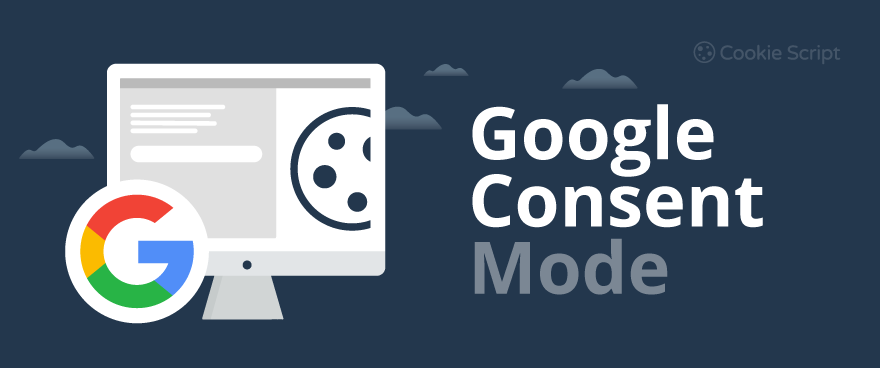Google Consent Mode installation instructions
Everything You Should Know About Using Google Consent Mode
CookieScript is a Google-certified CMP, which supports the Google Consent Mode v2.
Google Consent Mode was launched in September 2020 as a way for the search engine to maintain its robust digital advertisement business while attending to the growing need for consumer privacy in the wake of an increased number of data breaches.
Google Consent Mode is a tool which includes application programming interface (API) to control tag cookie storage based on user consent choices. The new API allows organizations to monitor conversions and use the powerful analytics tools they are accustomed to while maintaining compliance with the GDPR and other consumer privacy regulations around the world.
Google Consent Mode provides a means to run the same Google services businesses are accustomed to using, but the collected data is based on the consent of website viewers. CookieScript and Google Consent Mode work in sync to measure conversions and collect website analytics while maintaining all necessary privacy standards.
Consent Mode is here to control tag cookie storage based on user consent choices and to maintain a balance between business interests and users' privacy. More information about Google Consent Mode is available in the official Google Consent Mode documentation.
As of 2023, Google is updating from Google Consent Mode to Google Consent Mode v2. If you want to continue using Google Ads for your advertising in the EEA markets, you need to use a Cookie Banner integrated with Google Consent Mode v2 by March 2024. To ensure seamless functionality with Google Consent Mode Version 2, it is crucial to update your GTM CookieScript template to the latest version. This update addresses recent changes in permission settings within the GTM template, which are essential for the proper operation of Google Consent Mode Version 2. Delaying this update may result in compatibility issues in the Cookie Banner. We strongly recommend all users to make this update a priority to maintain smooth and compliant website operations.
Google Consent Mode-Certified CMPs
Google works in partnership with Consent Management Platforms (CMP). CMPs are integrated with Consent Mode and Google Tag Manager and thus help manage Cookie Consent banners and respect user's consent choice on a CMP banner. The CMP delivers user's choice to the Google tag via Consent Mode, and the tag adjusts its behavior accordingly.
CookieScript is a Google Consent Mode-certified CMP, integrated with a Google Tag Manager (GTM), and supports the Google Consent Mode v2.
See Google's list of Google Consent Mode-certified CMPs and a CookieScript GTM template. This template helps to properly integrate the CookieScript banner in GTM with Consent Mode support.
Note, that if you want to use cookies with Adsense, you need to have a CookieScript Plus plan and enable IAB TCF. Read the guide on how to implement Google Consent Mode.
Why is Google Consent Mode Important?
Google Consent Mode offers organizations a way to ensure that their previous analytics and marketing efforts can continue seamlessly. It honors both marketing and privacy interests by respecting user consent responses.
Organizations that wish to continue monitoring their marketing efforts while remaining in compliance with privacy regulations can do so while Consent Mode and CookieScript work together to modify the behavior of Google tags based on the user’s stated levels of consent. Google Consent Mode works to automatically block cookies unless the user gives proper consent.
Before Consent Mode, companies that launched targeted advertisements on websites were able to collect large amounts of personal data from users. Hackers and cybercriminals with ill intent were able to access data that wasn’t securely stored, leading to a public outcry over privacy. Consent Mode offers your website users a higher level of control over personal data.
GDPR and other popular privacy measures around the world popped up as a way to protect consumer interests and to allow them a say in what information they want to disclose. Google and other large online companies needed to adjust to growing consumer pressure around data privacy.
GDPR also sparked a push-and-pull effect between industry and consumers. Many well-meaning companies struggled to collect necessary information in a responsible manner while maintaining compliance with privacy standards.
This is where consent came into the picture as a method to protect the interests of both sides of the equation. The responsibility is on the business to establish consent before collecting personal data for targeted marketing purposes.
Google Consent Mode is a step toward honoring the privacy of individual users without altering the foundation of the digital economy.
How Does Google Consent Mode Work?
Google Consent Mode is a new API that works by introducing two new tag settings:
- analytics_storage
- ads_storage
These settings manage cookies for analytics and ads by using the global site tag or Google Tag Manager.
analytics_storage setting
The analytics_storage tag in Google Consent Mode allows businesses to control the behavior of statistics cookies based on the consent of end-users. This makes Google Analytics adjust its collection based on each individual case and level of consent given.
But even when users do not give a high level of consent, businesses can still collect generalized, non-specific data that remains useful.
Some of the data collected include:
- The time a user visited your site
- Referral data, or how the user came to your site
- Ad click data in the URL
ads_storage setting
The ads_storage tag allows companies to control marketing cookies on their website based on end-user consent. If the user does not consent, no marketing cookies are used in Google’s tags. Any marketing that these users see will be based on anonymous data instead of targeted advertising. The marketing insights that you receive from Google will all remain GDPR compliant.
What Services does Google Consent Mode Support ?
Google Consent Mode supports the search engine’s most prominent marketing platforms, including:
- Google Ads
- Google Tag Manager
- Google Analytics
- GTag
- Conversion Linker
- Floodlight
It works behind the scenes to make sure that these core platforms provide the same powerful insights while maintaining privacy compliance.
Google Consent Mode and CookieScript
Google Consent mode works best in tandem with a Consent Management Platform like CookieScript. CookieScript communicates your website users’ cookie preferences so that you gain full functionality from Google Consent Mode. The API can then work with Google Tag Manager or Gtag to operate Google Ads or Analytics.
When CookieScript is operational, it locates all cookies or trackers used by your website, and then controls them on an individual basis, following the level of consent that your website users indicate.
CookieScript is fully integrative with Google Consent Mode and Google Consent Mode v2, and works in tandem to provide the best possible experience for your business and your users while maintaining all applicable privacy laws.
The Google Consent Mode and CookieScript combination ultimately give users the leverage to choose what consent options work best for them. Google Consent Mode can then determine the behavior of all tags and scripts from that point to ensure all standards are met and that the user’s privacy requests are honored.
If no consent is given, then CookieScript and Google Consent Mode will respect the user’s decision and continue to block all relevant trackers with a help of the cookie privacy banner. Google’s API will match their consent level with the appropriate cookies and trackers deployed.
Read the guide on how to implement Google Consent Mode manually or using the CookieScript GTM Tag template.
Google Is Helping to Strike a Balance
With Google Consent Mode, companies have a middle ground in the choice between user privacy and targeted analytics. Google is working in response to the outcry from the public over data privacy and giving companies that rely on this data a lifeline at the same time.
By combining CookieScript with Google Consent Mode, you’ll end up with a more robust marketing platform that can maintain privacy standards set by GDPR, and other laws around the world.
How to Enable Google Consent Mode on Your Website?
To enable Google Consent Mode on your website, you should register and create a cookie consent banner. This is free and takes just a few minutes. Once ready, follow the Google Consent Mode implementatio instructions.
Make Google Consent Mode Work For You
CookieScript works in tandem with Google Consent Mode to ensure that your website follows users’ consent requests. Take a look at our pricing plans, and register for an account today. It is possible to affordably maintain compliance with privacy regulations.
Consent may become the standard for online privacy moving forward. Adopting consent as the basis for your data collection now can help you maintain future compliance.
Frequently Asked Questions
How does Google consent mode work?
Google Consent Mode includes APIs to control tag cookie storage based on user consent choices. It provides a way for websites to run the same Google services they are accustomed to using, but with the data collected being based on website user consent.
What is a Google consent mode?
Google Consent Mode is a tool which includes APIs to control tag cookie storage based on user consent choices. It allows for businesses to use Google products for advertisement while adhering to and complying with the GDPR and other consumer privacy regulations worldwide.
How do I get consent in Google Analytics?
By providing exhaustive privacy and cookie policy for your website visitors, you can receive user consent based on which consent options work best for them.
Is Google consent mode GDPR compliant?
Google consent mode maintains privacy standards set by the GDPR as well as other privacy laws and standards around the world.
How to enable Google Consent Mode?
First, you should register and create a cookie consent banner with CookieScript. This is free and takes just a few minutes. Once ready, follow the Google Consent Mode implementation instructions.
How do I know if Google Consent Mode is implemented into my website?
To make sure Google Consent Mode is active, register to a CookieScript account and create a cookie consent banner. This should only take a few minutes – then, follow the Google Consent Mode implementation instructions, where you could enable or disable Google Consent Mode or update your GTM template.
